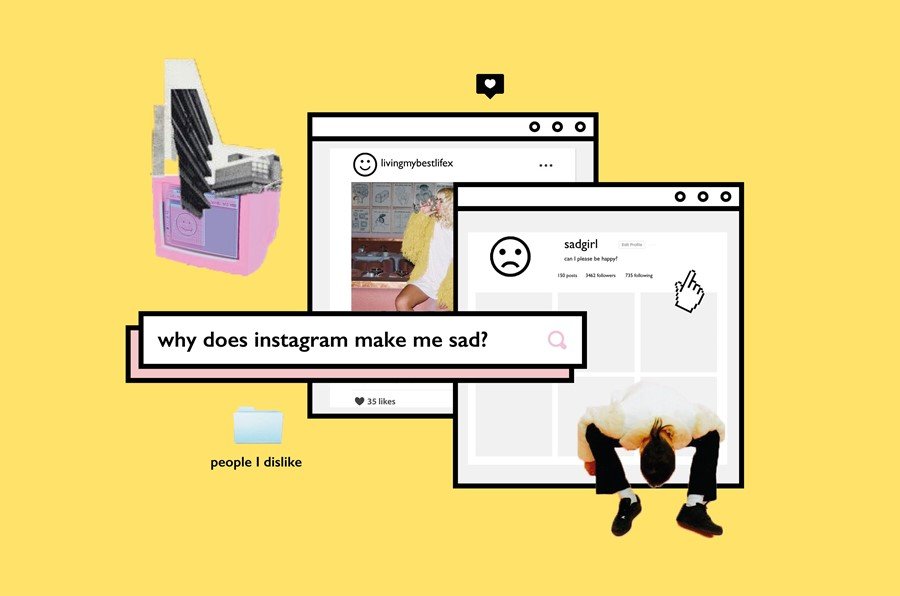Mental Health in the Age of Finstas
By: Lily Heritage
Depression and anxiety are things that plague our generation. The uprising of social media has acted as a catalyst for discussion on mental health, particularly by the generation that uses it the most, ours. The discussion of mental health on social media is something that rides a thin line, that line being honest discussion towards awareness and romanticizing mental illness.
There is a phenomenon in our generation called a ‘finsta’ or ‘spam account’. This is an Instagram account that is usually on private, and different from a main account. It digs deeper into the person’s life rather than just an edited highlight reel. Our generation uses these accounts (myself included) similar to a diary. The only difference is, the diary entries get likes and comments.
Social media at its base is about validation. Reward centers are lit up when we get likes on our most recent selfie, so what happens when the likes aren’t what you expected? In the real world, nothing has changed. In our heads, the dopamine release isn’t the same. It’s very easy to get caught up in this cycle and begin to feel differently about ourselves because of numbers on a screen. If we don’t feel the validation we’re seeking, it can lead to feeling worthless and lonely, regardless of reality. And ironically enough, social media is also the place where a lot of young people go to vent about these feelings. Of course, it’s not that black and white. But the correlation is worth noting.
Jean Twenge is the lead author of the book “iGen” and is a psychology professor at San Diego University. She says in an interview with NBC News,“We found a substantial increase in major depression or suicidal thoughts, psychological distress, and more attempted suicides after 2010, versus the mid-2000s, and that increase was by far the largest in adolescents and young adults.” This comment was based on a national survey published by the American Psychological Association.
Body shaming, photoshop, and the works have also been in the media lately as something for teens and parents to be aware of. Hours and hours of scrolling through Instagram and seeing photoshopped model after model, how can that be beneficial to anyone? The scary thing is: things like this have been almost normalized. Eating disorders, depression, anxiety, even suicidal thoughts. Common sense would lead anyone to the conclusion that romanticizing these topics should have no place on social media. So why is it so prevalent?
Jenks students aren’t immune to these problems. The Trojan Torch conducted a survey about mental health to see what students have to say about it.
75% of students who participated in the survey responded that they have had struggles with mental health in their time at JHS. The majority of that 75% said they struggled with depression or anxiety or some variant of the two. Feeling lonesome and not included was also on the list. The links to social media and these specific mental health issues significant.
The Trojan Torch also asked Jenks students how they have coped with some of these mental health issues.
“The first thing I did when I started feeling like I couldn’t handle the thoughts and uneasiness, was asking for help. Mental health is so serious and should never be taken for granted. I asked for help and was given a wonderful therapist I could tell how I was feeling. Not everyone is lucky enough to have that opportunity so I would tell them to ask for help from a trusted adult, parent, teacher, grandparent, coach, just anyone. They have more life experience than us and more likely than not, have felt the same way too. Talking to friends about it is good too, and many of them are feeling the same way as you right now and are trying to navigate through it too.”
“At first, I dealt with my problems badly, doing things they teach us not to do when suffering from these things. However, after opening up to trusted teachers and my close friends, I began getting the help I truly need and am now taking medicine and going to therapy for my problems. I would definitely tell people to make sure to always talk to people, even if it seems like a dumb reason to be upset over it. Just being open about things and not holding anything back is something that 100% helps make things feel better.”
If you feel as if social media is affecting your mental health negatively, you won’t be missing out by taking a break from it. It’s not the end of the world. Instead of venting to the internet, maybe vent to your mom or your dog.
If you’re in crisis, there are resources everywhere around JHS. Visit the counselors’ office in building 6 or Paula Lau in room 6122
Featured image courtesy of Dazed Digital
